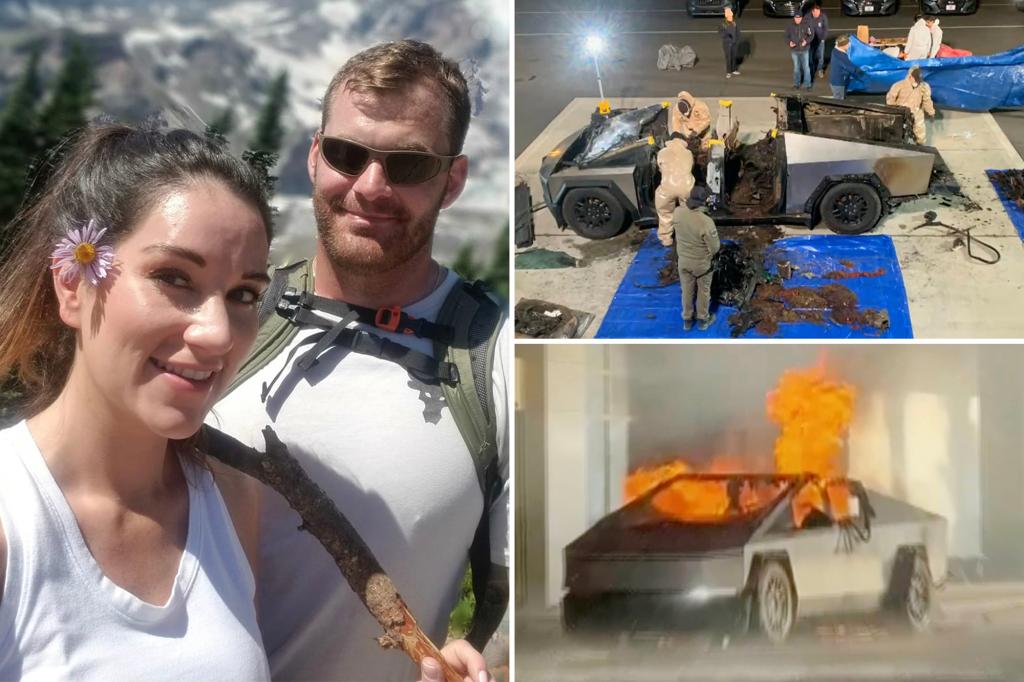The tragic suicide and vehicle explosion involving Army Ranger Matthew Livelsberger outside Trump International Hotel in Las Vegas was preceded by a series of seemingly innocuous text messages to his ex-girlfriend, Alicia Arritt. Livelsberger, 37, reached out to Arritt on December 29th from Denver, boasting about renting a Tesla Cybertruck. He described the experience as feeling “like Batman or Halo,” showcasing a childlike excitement that masked the dark intentions brewing beneath the surface. Arritt, surprised to hear from Livelsberger after their 2021 breakup, engaged in lighthearted conversation about the futuristic vehicle, unaware of the impending tragedy. This seemingly normal exchange, juxtaposed with the horrific event that followed, paints a picture of a man struggling internally while maintaining a facade of normalcy.
Livelsberger’s messages to Arritt, while focused on the Cybertruck, offered glimpses into his life and recent activities. He mentioned his new position involving drone building, suggesting a continued involvement in technology and potentially hinting at a level of expertise relevant to the later explosion. He also shared a bit about his personal life, including buying his ailing mother a new home, a detail that underscored Arritt’s description of him as the “kindest man” she knew. This positive portrayal further complicates the narrative, highlighting the stark contrast between the caring individual Arritt remembered and the desperate act he ultimately committed. The seemingly disconnected fragments of information in these messages, viewed in hindsight, offer a poignant and chilling glimpse into Livelsberger’s final days.
The events leading up to the explosion reveal a man grappling with personal turmoil. Just days before contacting Arritt, Livelsberger had a confrontation with his wife over alleged infidelity, leading to their separation and his departure from their Colorado Springs home. This marital breakdown, occurring shortly after Christmas, appears to be a significant catalyst for his subsequent actions. The emotional distress caused by the marital conflict likely exacerbated any pre-existing mental health struggles, pushing Livelsberger towards a breaking point. The timeline of events suggests a rapid descent into despair, culminating in the tragic decision to end his life in such a dramatic and public manner.
Following the argument with his wife, Livelsberger rented the Cybertruck using the Turo app and drove to Las Vegas. He parked the explosives-laden vehicle in the valet area of the Trump International Hotel, where he then shot himself. The ensuing explosion caused minor injuries to seven people, but Livelsberger was the only fatality. His body was so badly burned that identification was only possible through his passport and Army ID found within the wreckage. The presence of fireworks-style mortars, camping fuel, and canisters inside the truck confirmed the premeditated nature of the act. This level of planning suggests a deliberate and calculated decision, further adding to the complexity of understanding Livelsberger’s motivations.
The location of the explosion, outside a hotel owned by then President-elect Donald Trump, and the use of a vehicle manufactured by Elon Musk’s Tesla, immediately raised questions about potential political motivations. The FBI launched an investigation to determine if the bombing was politically charged, considering Livelsberger’s known conservative views and support for Trump. This investigation sought to unravel whether the act was a statement against Trump, a misguided act of support, or simply a random choice of location. Adding another layer to the investigation was the question of whether Livelsberger specifically chose the Cybertruck to minimize civilian casualties. This line of inquiry aimed to understand whether any element of planning was intended to reduce harm to others, despite the inherent danger of the act.
The incident sparked a complex investigation grappling with multiple unanswered questions. Authorities explored Livelsberger’s background, military service, and recent personal struggles to understand the factors that led to his drastic actions. The investigation sought to determine whether the explosion was a politically motivated attack, a desperate cry for help, or a combination of factors fueled by personal and ideological turmoil. The incident underscores the difficulty in deciphering the motivations behind such acts, particularly when the individual involved is no longer alive to offer any explanation. The lasting impact of Livelsberger’s final act remains a puzzle, leaving behind a trail of unanswered questions and a profound sense of tragedy.

